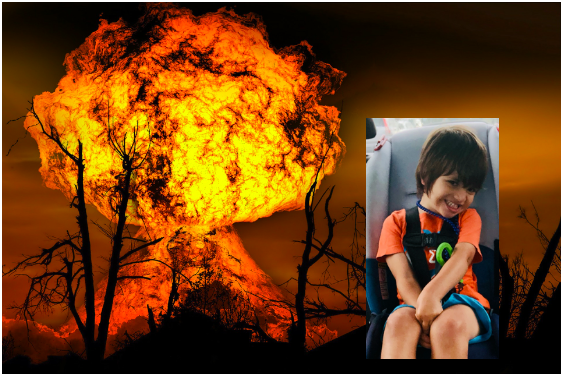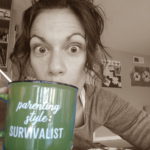
I made it ten years as a mother before I had to clean poop off of a wall.
This isn’t a bad record considering we’ve had no break from changing diapers for the past decade. After all, many children go through a poop-smearing baby/toddler phase, and this is one gross habit my kids never got into—though there are plenty of others!
A single, isolated poop-cleaning episode during year eleven of my marriage would not in itself be a noteworthy event—especially not in 2020, which has brought us all a plethora of adventures.
[…] our Asa might never be toilet trained
This excrement smearing, however, was done unintentionally by Asa, our five-year-old, and the fact is: there are likely many more in our future.
One of the good things—and sometimes a not-so-good thing—about participating in a support group for parents of children who share your young child’s severe genetic disorder is that you get a glimpse into his potential future. Frankly, this is sometimes beyond depressing. And I imagine hearing about our challenges with Asa could be very disheartening to the parent of a younger child freshly diagnosed.
But it can also be quite instructive. If you hear about an impending unpleasantness ahead of time—especially from many people, and on many occasions—you just might not completely lose it when it happens to you. This turned out to be my experience with the wall poop.
It’s true, I am a bit of an extremist when it comes to cleaning feces. With your own children, even the most poop-averse among us seem miraculously to acquire a stronger stomach, but still, I have always deferred to my husband, whenever possible, for that type of diaper change. Before we knew our Asa might never be toilet trained, I used to joke that we could only get a dog when everyone in my house could wipe his own bottom. (You are looking at one family that is not getting a dog anytime soon, unless it’s a therapy dog.)
As a result of my aversion, I have not always handled poop-related frustrations well. Our middle son was slow to potty train due to stubbornness and an impressive immunity to peer pressure.
Me: Did you notice all the other kids are wearing underwear?
Him: So? They wear underwear; I wear Pull-ups!
At some point after he turned four, as he was defecating multiple times a day with no sign of imminent in-toilet discharge, I lost it—and yelled at him about it. A lot. It scared him, and I apologized. In retrospect, it was ridiculous for me to be so unhinged about a few more months than average of diaper changes—especially since he finally acquiesced soon after.
it is impressive to see how much experience can provide perspective
Asa was diagnosed with Phelan-McDermid Syndrome about a year after that. In what may actually be an example of true situational irony, this mom—who couldn’t handle a four-year-old still in Pull-ups—learned she had a child who will likely be in diapers his whole life.
As I began to participate in our parent support group, I noticed several posts asking for advice regarding how to prevent, and deal with the aftermath of, what more than one parent described as “poopocalypse”. I’ve been amazed at how calmly and with such good humor these parents could discuss topics such as which adult diapers and clothing might best help prevent these occurrences and which cleaning products best conquer the messes. They wrote with compassion and without bitterness about challenges far outside the realm not only of what I had ever experienced, but beyond what I thought I could handle—or to be honest, I even knew existed.
Don’t get me wrong: parents of children with severe disabilities can get frustrated and angry just like anyone else. We are far from saints. But it is impressive to see how much experience can provide perspective.
I will admit, when I first saw a post about older-child poop explosions, I was in denial: “That will never be my child,” I told myself. Over time, I realized that might just be my child. Children like Asa lay bare the truth we are often afraid to admit to ourselves: that we really don’t know what the future holds for any of our children, nor do we have nearly as much control over it as we like to think.
When Asa unleashed a rather voluminous load a couple of weeks ago and then, before we noticed, decided to climb up on his closet shelf and lean back against the wall, it turned out I was more ready than I thought I would be.
People can become capable of a lot more than we can imagine.
I helped my husband remove Asa’s soiled clothes, and while he cleaned him up, I went into the room to assess the damage. A few years ago, this would have made me very upset, and I might have asked my husband to handle it without me so I wouldn’t have to deal with it.
Instead, I had a sort of out-of-body experience: I watched myself calmly grab a package of wipes and start cleaning the wall. I wasn’t mad. I wasn’t depressed, even though I could swear a dramatic voice somewhere inside my consciousness said something like: “And so it begins.” I wasn’t happy, but I didn’t feel hopeless or stressed. Most importantly, it seemed like something I could handle, not only practically, but psychologically, with equanimity.
By no means do I think that I have arrived at some new plane of consciousness. I still get rattled by things and I still yell. I haven’t ever achieved this same mental space in the rare times Asa bites me.
But I never could have conceived that I could calmly clean poop off the wall, especially knowing it was not a unique occurrence, but rather an activity I likely must do, from time to time, for the rest of my life—possibly with a lot more poop from a much larger boy.
People can become capable of a lot more than we can imagine. But, in cases like ours, that doesn’t make the reason we must become capable any less heartbreaking.
Image by Gerd Altmann from Pixabay




LOL, Laura–I will add that to the many other euphemisms people have shared since I posted this! 😛
Mama strength and definitely the Award for most amazing and efficient “Sanitization of a Toddler” goes to…..Talya!!
“Code Brown” is what we call in our house!